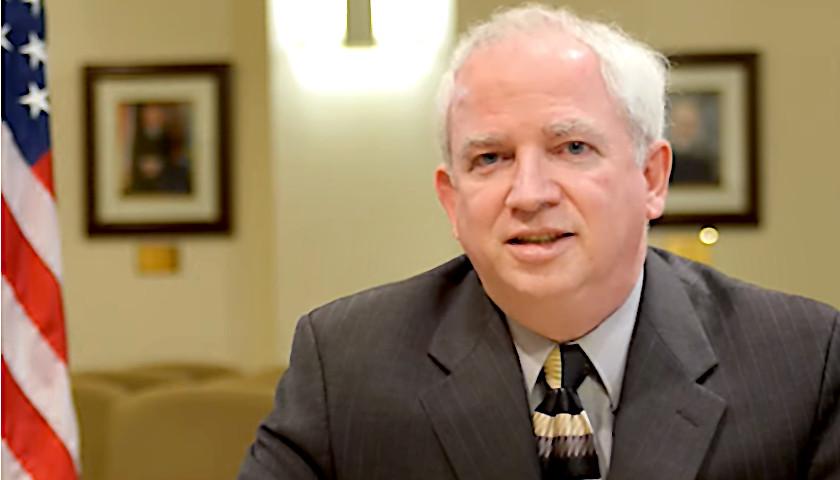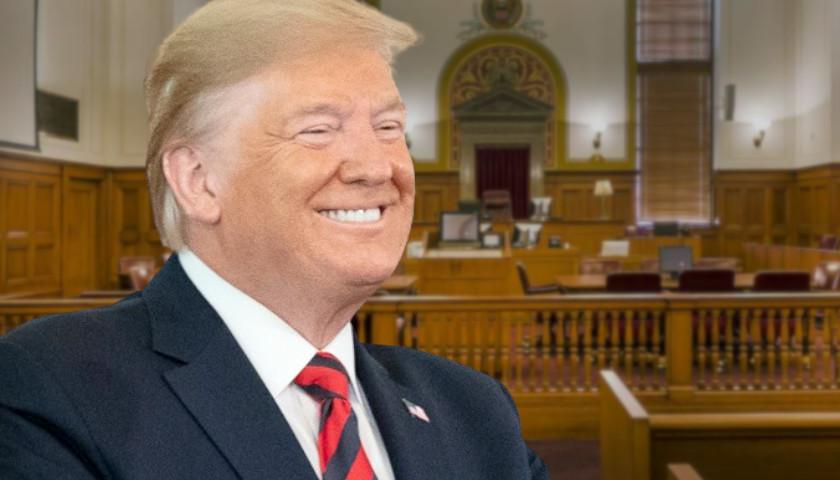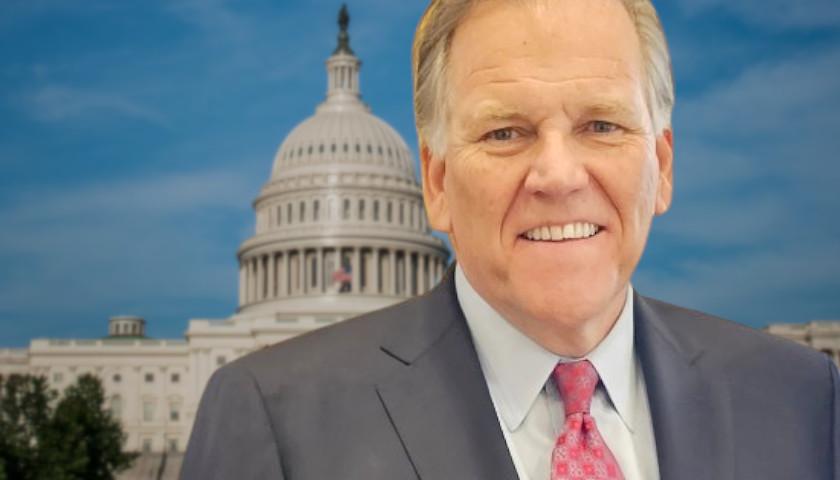The fourth week of the disbarment trial of Donald Trump’s attorney John Eastman resumed on Tuesday, with State Bar of California attorney Duncan Carling continuing his cross-examination of the constitutional scholar. The bar is trying to take away his license to practice law due to advising Trump that Vice President Mike Pence may have had the authority to reject electoral slates from states suspected of election fraud.
Judge Yvette Roland told Eastman multiple times while he was testifying that he wasn’t an expert on the subject. A constitutional attorney who has watched the entire trial so far but who declined to be identified for fear of retaliation told The Arizona Sun Times, “Eastman is not an expert on this. He is THE expert on this.”
Eastman’s attorney Randy Miller asked Roland about their Motion for Abatement, requesting that the trial be postponed until after the criminal prosecution in Georgia ends. Fulton County DA Fani Willis indicted Eastman along with Trump and 18 others last month. Miller argued that it would be difficult for Eastman to defend himself in both trials simultaneously. Usually when there are criminal and civil trials both taking place against a defendant, the civil one will be postponed until after the criminal one. Miller said that three of the witnesses who were on the pretrial list to testify on behalf of Eastman can no longer testify for fear of implicating themselves in the criminal proceeding, which further places Eastman at a disadvantage. Roland dismissed their concerns.
Carling asked Eastman whether the alternate slates of electors had “legal authority” backing them, citing a memo Eastman had written previously where he admitted they had no authority due to not having a Certificate of Ascertainment from state officials. Eastman explained that they had similar authority to the alternate slate of electors in Hawaii in 1960. There, Hawaii’s electors submitted a slate of electors for Richard Nixon, then Democrats submitted a competing uncertified slate for John F. Kennedy. After court proceedings over the matter finished, it was determined that Kennedy really won, and so the slate for Kennedy was ultimately accepted.
Carling went over various memos Eastman wrote advising lawyers and advisors to Trump, showing how his advice wasn’t black and white on the issue. Eastman wrote in one memo that it wasn’t legally very clear under the Twelfth Amendment that Mike Pence had the authority to reject electoral slates unilaterally; Eastman said the more correct interpretation might be that the vice president must work in conjunction with Congress to make that determination. He said the Twelfth Amendment is ambiguous about congressional versus the vice president’s authority there.
Carling asked Eastman about a memo he’d written where he warned that there might not be relief from the courts on the issue of Pence rejecting electoral slates, implying that Eastman knew the courts would rule against the challenges. Eastman corrected him and said his concern was that the courts might not accept the case at all, since it could be a “nonjusticiable” issue, meaning the courts did not have the authority to wade into the dispute since the Constitution gave that power to the vice president.
Next, Carling asked Eastman about cases filed in the states suspected of election fraud. He attempted to get him to admit that Pennsylvania conducted an audit or recount after the election. Eastman corrected him, stating that officials merely conducted a “risk limiting audit,” which was only a very small number of ballots that merely reflected the voting machine tabulator count and would not have caught any “fractional votes.”
Carling asked Eastman about a lawsuit in Arizona over election officials extending the deadline for voter registration past the statutory deadline, from October 5, 2020 to October 23, 2020. Carling tried to gloss over what happened, and despite the fact Eastman wasn’t even involved in that case, he pushed back and got the details out. The district court allowed the extension, however upon appeal, the Ninth Circuit Court of Appeals reversed the lower court stating that the extension was illegal. The higher court then only allowed those who had registered up to 10 days after the original deadline to vote.
Eastman emphasized that a core issue was election officials changing the law at the last minute, subverting the authority of the state legislatures which are empowered with setting election law. He said many of the election challenges were brought on that issue “whether non-legislative officials can alter election law at the last minute.” Eastman stressed that the challenges were over breaking the law, including crimes, but not necessarily the specific crime of “voter fraud.”
Carling read the text from opinions by judges throwing out the cases. One judge said that the lawsuit contained “strained legal arguments without merit amid speculative legal arguments.” Eastman responded and said he disagreed, since the plaintiffs had shown plenty of evidence that laws were broken.
Carling brought up several more election cases that were never adjudicated on the merits because judges threw them out on technicalities such as standing or the doctrine of laches. In Michigan, a lawsuit over mailing out unrequested applications for absentee ballots was thrown out by a majority of justices, but there were “strong dissenting opinions,” Eastman said.
In a lawsuit over drop boxes, a court ruled that the ones installed after October 1, 2020 violated the law. In one of the Michigan cases, a judge ruled on a motion for a preliminary injunction without ever holding an evidentiary hearing — something Eastman said didn’t really follow Michigan law.
Regarding a Wisconsin challenge over voters who were allowed to submit requests for absentee ballots without ID, Eastman pointed out that the court ruled that two clerks had given illegal advice telling voters that was acceptable. However, the court wouldn’t go as far as disqualifying their votes.
Eastman criticized the courts for dismissing cases based on the doctrine of laches, which means they weren’t timely. A large number of the 2020 election challenges were dismissed on that basis, not adjudicated on the merits. Eastman was especially critical of the doctrine of laches being used in election cases, since he said it was impossible for people to bring them before the election, since they’re not “ripe.”
Carling asked Eastman about a lawsuit in Georgia that was thrown out over laches. There, Georgia Secretary of State Brad Raffensperger entered into a settlement agreement with the Democratic Party eight months before the election over how signature verification on absentee ballots should be conducted. The court said the agreement had no effect on the election, and Eastman said he disagreed.
Carling tried to persuade Eastman into admitting that law review articles don’t discuss whether the vice president can reject electoral slates. Eastman responded and said there are at least three law review articles that analyze whether a vice president has the authority to determine a dispute — one of the three specifically focused on rejecting slates — and reminded him that Thomas Jefferson made a determination as vice president to specifically accept disputed electoral slates.
Roland questioned Eastman about his view that the Electoral Count Act might be unconstitutional since it granted power to Congress to adjudicate challenges to electoral slates, something not in the Constitution. She asserted since the courts have never struck it down that it is valid law. But Eastman retorted that just because the courts haven’t ruled on the constitutionality of something, doesn’t make it valid, pointing out that it may be a nonjusticiable issue where the courts cannot intervene.
One of the top legal experts in Arizona on election law and prosecution, who cannot be identified due to fear of retaliation, pointed out in regards to the Eastman disbarment trial that attorneys have always challenged legal precedents that went against them with lawsuits until now and no one was ever disbarred or prosecuted. He cited Plessy v. Ferguson, Griswold v. Connecticut, Lawrence v. Texas, and the recent Dobbs v. Jackson abortion case.
The trial is being livestreamed and begins at 10 a.m. the rest of the week. It is expected to continue through next week unless interrupted by the Georgia prosecution.
– – –
Rachel Alexander is a reporter at The Arizona Sun Times and The Star News Network. Follow Rachel on Twitter. Email tips to [email protected].






Eastman has deliberately confused “election fraud” which might be a basis for invalidating an election, with “election irregularities” which occur in EVERY election. The remedy for de miniis election irregularities is to bring suit BEFORE the election.It is NOT to wait until you see who won and then challenge the vote only in the areas where you lost.
These people are all scammers and Eastman is a criminal